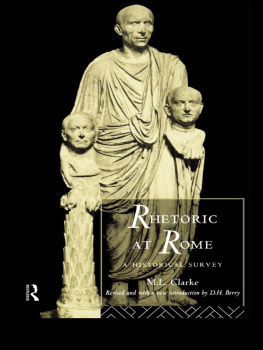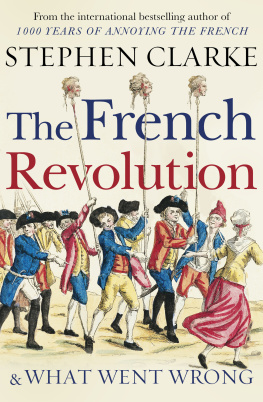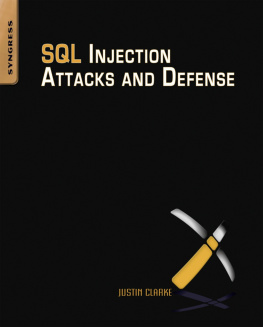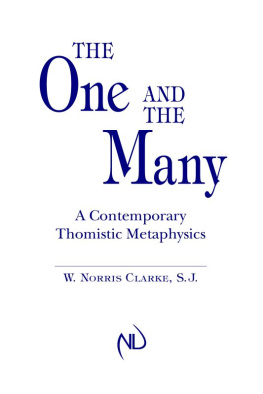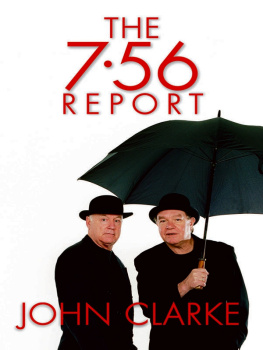Clarke - 1953;1996;
Here you can read online Clarke - 1953;1996; full text of the book (entire story) in english for free. Download pdf and epub, get meaning, cover and reviews about this ebook. City: London;Rome (Empire, year: 1953;1996;2011, publisher: Routledge;Cohen & West, genre: Detective and thriller. Description of the work, (preface) as well as reviews are available. Best literature library LitArk.com created for fans of good reading and offers a wide selection of genres:
Romance novel
Science fiction
Adventure
Detective
Science
History
Home and family
Prose
Art
Politics
Computer
Non-fiction
Religion
Business
Children
Humor
Choose a favorite category and find really read worthwhile books. Enjoy immersion in the world of imagination, feel the emotions of the characters or learn something new for yourself, make an fascinating discovery.
- Book:1953;1996;
- Author:
- Publisher:Routledge;Cohen & West
- Genre:
- Year:1953;1996;2011
- City:London;Rome (Empire
- Rating:5 / 5
- Favourites:Add to favourites
- Your mark:
- 100
- 1
- 2
- 3
- 4
- 5
1953;1996;: summary, description and annotation
We offer to read an annotation, description, summary or preface (depends on what the author of the book "1953;1996;" wrote himself). If you haven't found the necessary information about the book — write in the comments, we will try to find it.
1953;1996; — read online for free the complete book (whole text) full work
Below is the text of the book, divided by pages. System saving the place of the last page read, allows you to conveniently read the book "1953;1996;" online for free, without having to search again every time where you left off. Put a bookmark, and you can go to the page where you finished reading at any time.
Font size:
Interval:
Bookmark:

This new edition of M.L.Clarkes classic study of Roman rhetoric incorporates corrections and a new introduction by D.H.Berry. A bibliography has also been provided for the first time.
Praise for the first edition:
Professor Clarkes book presents both a reliable and a pleasant introduction to the subject. It should be read by every classical scholar.
A.D.Leeman, Mnemosyne
admirably organized and documentedmarked by great clarity and good sense. Latinist and layman alike will enjoy and profit by this excellent book.
Richard T.Brure, Classical Philology
It isa pleasantly written book, fully documented, and will be a useful text for anyone wishing an introduction to this branch of Latin literature.
Harry M.Hubbell, American Journal of Philology
The book will, one feels, hold its place as a standard work for some time to come.
E.W.Bower, Classical Review
M.L.Clarke is Emeritus Professor of Latin at the University College of North Wales, Bangor. His other books include TheRoman Mind (1956), Higher Education in the Ancient World (1971) and The Noblest Roman (1981). D.H.Berry is Lecturer in Classics at the University of Leeds and the editor of Cicero: ProP. Sulla Oratio (1996).
AT ROME
A Historical Survey
Revised and with a new introduction by
D.H.Berry
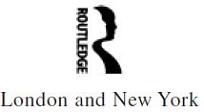
First published 1953
This edition published in the Taylor & Francis e-Library, 2002.
Second edition 1966
by Cohen & West Ltd
Third edition published 1996
by Routledge
11 New Fetter Lane, London EC4P 4EE
Simultaneously published in the USA and Canada
by Routledge
29 West 35th Street, New York, NY 10001
1953, 1966, 1996 M.L.Clarke
Revisions and introduction 1996 D.H.Berry
All rights reserved. No part of this book may be reprinted or reproduced or utilized in any form or by any electronic, mechanical, or other means, now known or hereafter invented, including photocopying and recording, or in any information storage or retrieval system, without permission in writing from the publishers.
British Library Cataloguing in Publication Data
A catalogue record for this book is available from the British Library
Library of Congress Cataloguing in Publication Data
Clarke, M.L. (Martin Lowther)
Rhetoric at Rome: a historical survey/M.L.Clarke.Rev. ed.
/rev. and with a new introduction by D.H.Berry.
p. cm.(Routledge classical studies)
Includes bibliographical references and index.
ISBN 0-415-14155-9.ISBN 0-415-14156-7 (pbk.)
1. Speeches, addresses, etc., Latin-History and criticism
Theory, etc. 2. Oral communication-Rome. 3. Rhetoric, Ancient.
4. Oratory, Ancient. I. Berry, D.H. II. Title. III. Series.
PA6083.C6 1996
875'.0109dc20
963816
CIP
ISBN 0-203-43872-8 Master e-book ISBN
ISBN 0-203-74696-1 (Adobe eReader Format)
ISBN 0-415-14156-7 (Print Edition)
THE AGE of Rhetoric, wrote Thomas de Quincey over a century ago, like that of chivalry, has passed amongst forgotten things. In a sense he was wrong. The art of persuasion is always with us, though it assumes new forms and is called by new names, such as advertising and propaganda. The spoken word is still a power, especially since broadcasting made us once more a listening rather than a reading people. But rhetoric as the ancients knew it, the systematic study of the art of argument and expression, has certainly passed away. The last substantial treatise on the subject published in this country, that of Archbishop Whately, appeared in 1828. Today we have only breezy little handbooks on after-dinner speakingworks which would have made Quintilian stare and gasp. In France rhetoric was banished from the secondary school curriculum in 1885. Only in America, with her professors of Rhetoric and University Departments of Speech, does something of the old tradition survive.
Yet anyone who studies the civilisation of Rome cannot fail to come up against rhetoric. The schoolboy reads speeches of Cicero in the Latin class while he reads plays or novels in the French class. The more advanced student comes upon the massive works of Cicero and Quintilian devoted to rhetoric, and discovers how large a part the subject played in Roman education. He observes too, perhaps with distaste, how the rhetorical manner spreads from oratory to other forms of literature. Some understanding of rhetoric is necessary for anyone who wishes to understand ancient Rome. To assist such an understanding this book has been written. In it I have tried to show what rhetoric meant to the Roman world from its first introduction to the end of classical civilisation. I have not gone deeply into the technicalities of ancient rhetorical theory, knowing how few there are who can summon up any interest in them and remembering the scorn which one of the earliest Latin writers on rhetoric expressed for those who ne parum multa scisseviderentur, ea conquisierunt quae nihil attinebant ut ars difficiliorcognitu putaretur.
I should like to acknowledge a particular debt to two works, Krolls authoritative survey in Pauly-Wissowas Realencyclopdie, Supplementband VII (cited in the notes as Kroll, Rhetorik) and Aubrey Gwynns Roman Education from Cicero to Quintilian, which first aroused my interest in the subject. I am grateful to Dr. J.F.Lockwood, Master of Birkbeck College, London, for lending me an offprint of Krolls article when the volume in which it has since appeared was not yet available in this country, and for reading and criticising my work in typescript. I have also profited by the criticisms of my colleague Dr. R.A.Browne. Finally I must thank the Board of the University of Wales Press for their generosity in making a grant towards the cost of publication.
1953
I HAVE taken the opportunity of a new impression to alter a few passages where the original text seemed to me to be misleading and to add to the notes some references to recent work on the subject.
M.L.C.
1965
THE TWO most important accomplishments a man in the ancient world could possess were generally agreed to be skill in the military sphere and skill in speaking. In the Iliad young heroes like Achilles are mighty warriors, while older ones, such as Nestor, are wise and impressive speakers. The elderly Phoenix was sent to Troy with Achilles to make him a speaker of words and a doer of deeds (Hom. Il. 9.443). In democratic Athens, generals took their orders from the assembly, which reached decisions after listening to the arguments on either side; Thucydides acknowledged the importance of oratory by including speeches in his history. At Rome, L.Metellus, the consul of 251 and 247 B.C., was praised in the funeral speech given for him by his son as having been a first-class warrior, a brilliant orator and a very brave commander (Plin. Nat. 7.140). To any Roman, military ability was, of course, more important than oratory: even Cicero conceded that (Mur. 30; Brut. 256; cf. Off. 2.458). Nevertheless, a good general would have to know how to address his troops, and if he was not an orator he would also, like Marius, find himself disadvantaged in the political arena. Marius and Cicero, both
Font size:
Interval:
Bookmark:
Similar books «1953;1996;»
Look at similar books to 1953;1996;. We have selected literature similar in name and meaning in the hope of providing readers with more options to find new, interesting, not yet read works.
Discussion, reviews of the book 1953;1996; and just readers' own opinions. Leave your comments, write what you think about the work, its meaning or the main characters. Specify what exactly you liked and what you didn't like, and why you think so.

